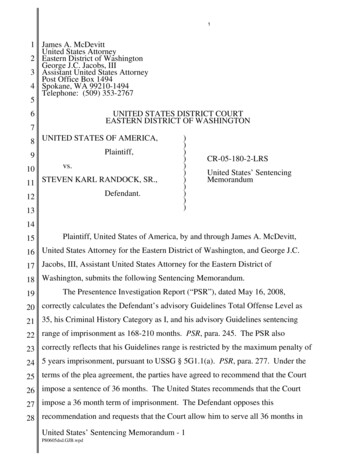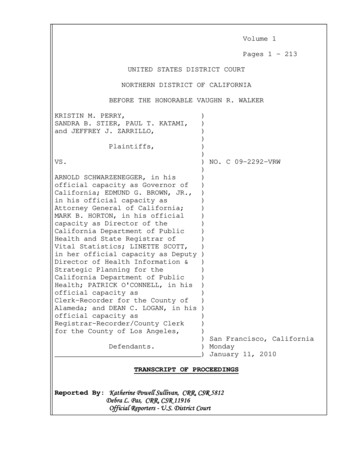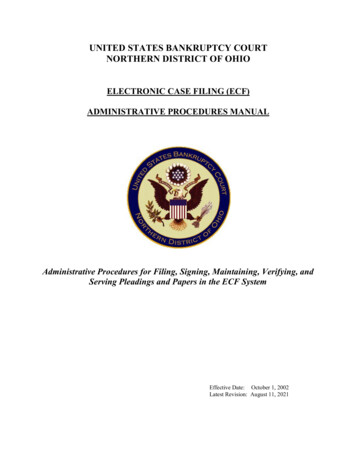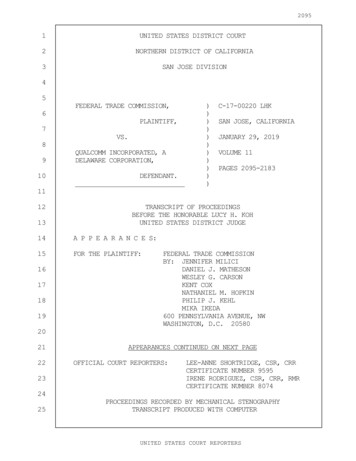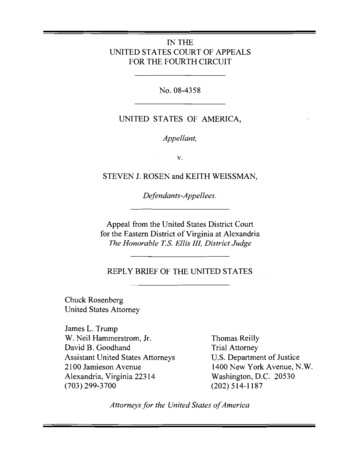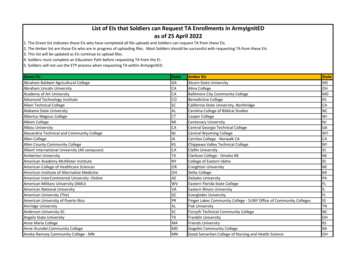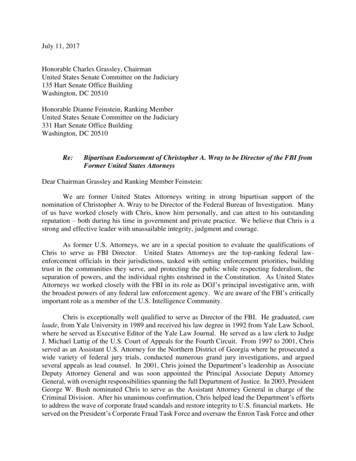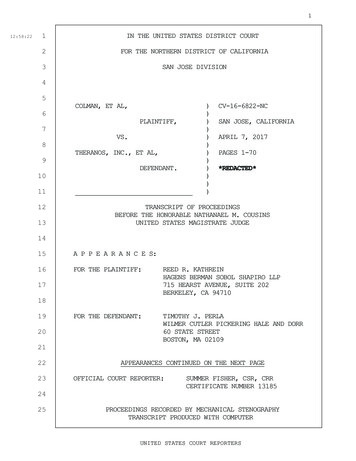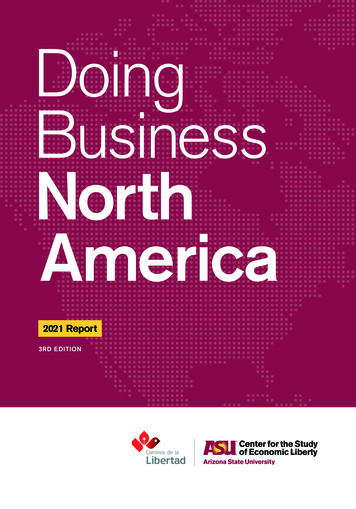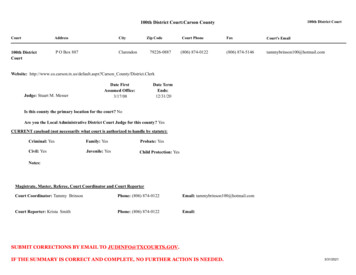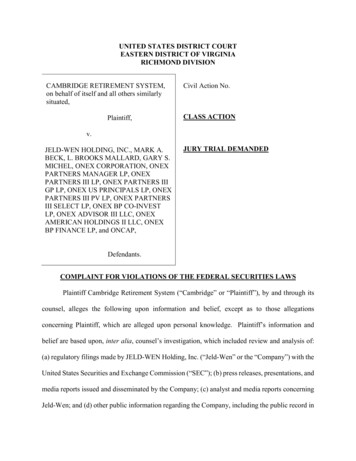
Transcription
UNITED STATES DISTRICT COURTEASTERN DISTRICT OF VIRGINIARICHMOND DIVISIONCAMBRIDGE RETIREMENT SYSTEM,on behalf of itself and all others similarlysituated,Plaintiff,Civil Action No.CLASS ACTIONv.JELD-WEN HOLDING, INC., MARK A.BECK, L. BROOKS MALLARD, GARY S.MICHEL, ONEX CORPORATION, ONEXPARTNERS MANAGER LP, ONEXPARTNERS III LP, ONEX PARTNERS IIIGP LP, ONEX US PRINCIPALS LP, ONEXPARTNERS III PV LP, ONEX PARTNERSIII SELECT LP, ONEX BP CO-INVESTLP, ONEX ADVISOR III LLC, ONEXAMERICAN HOLDINGS II LLC, ONEXBP FINANCE LP, and ONCAP,JURY TRIAL DEMANDEDDefendants.COMPLAINT FOR VIOLATIONS OF THE FEDERAL SECURITIES LAWSPlaintiff Cambridge Retirement System (“Cambridge” or “Plaintiff”), by and through itscounsel, alleges the following upon information and belief, except as to those allegationsconcerning Plaintiff, which are alleged upon personal knowledge. Plaintiff’s information andbelief are based upon, inter alia, counsel’s investigation, which included review and analysis of:(a) regulatory filings made by JELD-WEN Holding, Inc. (“Jeld-Wen” or the “Company”) with theUnited States Securities and Exchange Commission (“SEC”); (b) press releases, presentations, andmedia reports issued and disseminated by the Company; (c) analyst and media reports concerningJeld-Wen; and (d) other public information regarding the Company, including the public record in
the following litigations against Jeld-Wen: Steves and Sons, Inc. v. Jeld-Wen, Inc., No. 3:16-cv00545-REP (E.D. Va.); In re Interior Molded Doors Antitrust Litig., No. 3:18-cv-00718-JAG(E.D. Va.); and In re Interior Molded Doors Indirect Purchaser Antitrust Litig., No. 3:18-cv00850-JAG (E.D. Va.).INTRODUCTION1.This securities class action is brought on behalf of all persons or entities thatpurchased or otherwise acquired shares of Jeld-Wen’s common stock between January 26, 2017and October 15, 2018, inclusive (the “Class Period”). The claims asserted herein are allegedagainst Jeld-Wen, certain of the Company’s current and former senior executives, and controllingshareholder Onex, as defined herein (collectively, “Defendants”), and arise under Sections 10(b)and 20(a) of the Securities Exchange Act of 1934 (the “Exchange Act”) and Rule 10b-5,promulgated thereunder.2.Jeld-Wen is one of the world’s largest door and window manufacturers.Headquartered in Charlotte, North Carolina, the Company designs, produces, and distributes arange of doors, windows, and related products.3.The interior molded door is the most popular type of interior door in North America.Manufacturers produce interior molded doors by joining two door skins between a wood framefilled with a hollow or solid core. Door skins are the principal component of interior molded doors,accounting for up to 70% of the cost to manufacture a molded door.4.Jeld-Wen and its primary competitor, Masonite Corporation (“Masonite”), are thetwo largest manufacturers of interior molded doors in the United States. In October 2012, JeldWen acquired another manufacturer of interior molded doors and door skins, CraftMasterManufacturing, Inc. (“CMI”). As a result of that acquisition, Jeld-Wen gained ownership of CMI’sflagship door skin manufacturing plant in Towanda, Pennsylvania, and removed CMI as the third2
source of door skin supply in the interior molded doors market.5.After the acquisition, Jeld-Wen and Masonite became the only two manufacturersof door skins in the United States and controlled 85% of the market for interior molded doors.Because the manufacturers comprising the other 15% of the interior molded doors market did notindependently manufacture door skins, domestically, they were left with no choice but to purchasedoor skins from either Jeld-Wen or Masonite.6.Prior to its acquisition of CMI, Jeld-Wen had aggressively competed with Masonitefor the sale of door skins to other interior door manufacturers. In late 2012, however, shortly afterJeld-Wen acquired CMI, Jeld-Wen and Masonite began imposing uniform price increases oninterior molded doors. At least nine different times between 2012 and 2018, Jeld-Wen andMasonite increased the prices of their interior molded doors in the same or similar percentageincrements, either simultaneously or in brief succession of each other.7.In early 2014, Jeld-Wen announced that it had implemented a new pricing strategy,shifting from its old strategy to grow volumes and increase market share that “often led tocompeting on price” to a new strategy that emphasized “pricing optimization” to increase productprofitability on a per unit basis.8.Just several months later, in June 2014, Masonite abruptly and inexplicably stoppedselling door skins to other door manufacturers, making Jeld-Wen the market’s sole supplier ofdoor skins. Around the same time, Jeld-Wen began taking adverse actions against independentdoor manufacturers with which the Company had long-term agreements to supply door skins by,among other things, raising prices. In response to Jeld-Wen’s price increases, in June 2016, oneof those independent door manufacturers, Steves and Sons, Inc., filed a lawsuit against Jeld-Wen,Inc., a wholly owned subsidiary of Jeld-Wen, in the Eastern District of Virginia, alleging that the3
Company’s acquisition of CMI and Jeld-Wen’s subsequent price increases for its interior moldeddoors and door skins violated federal antitrust laws (the “Steves Litigation”). Steves and Sons,Inc. v. Jeld-Wen, Inc., No. 3:16-cv-545 (E.D. Va.) (ECF No. 1).9.On or around January 27, 2017, Jeld-Wen conducted an initial public offering ofthe Company’s common stock (the “IPO”). Four months after the IPO, on or around May 24,2017, Jeld Wen conducted a secondary public offering of the Company’s common stock (the “FirstSPO”). Then, six months after the First SPO, on or around November 15, 2017, Jeld-Wenconducted another secondary public offering of the Company’s common stock (the “SecondSPO”).10.Throughout the Class Period, Defendants engaged in a scheme to defraud and madematerially false and misleading statements, as well as failed to disclose material adverse facts,regarding the Company’s business, operations, growth prospects, and competitive positioning.Specifically, Defendants stated that Jeld-Wen products, including doors, compete against othermanufacturers on price, and described the market in which the Company sells its doors as “highlycompetitive.” Defendants also attributed Jeld-Wen’s strong margins and anticipated margingrowth to legitimate business factors, such as “making strategic pricing decisions based on ananalysis of customer and product level profitability” and increasing its emphasis on “pricingoptimization.” These and similar statements made by Defendants during the Class Period werefalse and misleading because Defendants knew that Jeld-Wen was engaged in a price-fixingconspiracy with another door manufacturer to artificially increase or maintain prices of interiormolded doors. As a result of Defendants’ misrepresentations, shares of Jeld-Wen’s common stocktraded at artificially inflated prices throughout the Class Period.11.On February 15, 2018, the Company announced that a jury returned a verdict4
against Jeld-Wen in the Steves Litigation, finding that Jeld-Wen’s conduct violated the U.S.antitrust laws. However, the true breadth of Jeld-Wen’s misconduct and the financial impact ithad on the Company’s business continued to be concealed from investors. Moreover, Jeld-Wencontinued to assure investors that it participated in a highly competitive market.12.On August 7, 2018, a veteran industry analyst at J.P. Morgan slashed his estimatesfor Jeld-Wen’s earnings in 2018 and 2019 and lowered his price target for Jeld-Wen’s stock, based,in part, on the “ongoing Steves and Sons litigation.” In response to the J.P. Morgan report, JeldWen’s stock price declined by 10%, from 26.33 per share to 23.71 per share, on high tradingvolume.13.On October 5, 2018, the Judge presiding over the Steves Litigation ruled that Jeld-Wen would be required to divest the door skin facility the Company had obtained in connectionwith its acquisition of CMI. This disclosure, which spurred several analyst downgrades, causedthe price of Jeld-Wen shares to decline by nearly 5%.14.Then, on October 15, 2018, after the market closed, Jeld-Wen announced that theCompany expected its third quarter 2018 financial results to include a 76.5 million charge relatedto the ongoing Steves Litigation. The Company also announced the resignation of its CFO, BrooksMallard. In response to these disclosures, Jeld-Wen’s stock price declined from 21.31 per shareto 17.28 per share, on high trading volume, a decline of 19%.JURISDICTION AND VENUE15.The claims alleged herein arise under Sections 10(b) and 20(a) of the Exchange Act(15 U.S.C. §§ 78j(b) and 78t(a)), and Rule 10b-5 promulgated thereunder (17 C.F.R. § 240.10b5). This Court has jurisdiction over the subject matter of this action pursuant to Section 27 of theExchange Act (15 U.S.C. § 78aa) and under 28 U.S.C. § 1331, because this is a civil action arisingunder the laws of the United States.5
16.Venue is proper in this District pursuant to Section 27 of the Exchange Act (15U.S.C. § 78aa) and 28 U.S.C. § 1391(b). Jeld-Wen transacts business in Virginia, including in thisDistrict. In connection with the acts alleged in this Complaint, Defendants, directly or indirectly,used the means and instrumentalities of interstate commerce, including, but not limited to, themails, interstate telephone communications, and the facilities of the national securities markets. Inaddition, related actions filed against Jeld-Wen are currently pending in this District. See Stevesand Sons, Inc. v. Jeld-Wen, Inc., No. 3:16-cv-545 (E.D. Va.); In re Interior Molded Doors AntitrustLitig., No. 3:18-cv-00718-JAG (E.D. Va.); In re Interior Molded Doors Indirect PurchaserAntitrust Litig., No. 3:18-cv-00850-JAG (E.D. Va.).PARTIESA.Plaintiff17.Plaintiff Cambridge Retirement System is a contributory retirement system foractive and retired employees of the City of Cambridge, Massachusetts, the Cambridge HousingAuthority, the Cambridge Public Health Commission, and the Cambridge RedevelopmentAuthority. As of September 30, 2019, Plaintiff manages approximately 1.3 billion in assets onbehalf of approximately six thousand participants. As indicated on the certification submittedherewith, Cambridge purchased Jeld-Wen common stock at artificially inflated prices during theClass Period and suffered damages as a result of the violations of the federal securities laws allegedherein.B.Defendants18.Defendant Jeld-Wen is incorporated in Delaware and maintains its corporateheadquarters at 2645 Silver Crescent Drive, Charlotte, North Carolina. The Company’s commonstock trades on the New York Stock Exchange (“NYSE”) under ticker symbol “JELD.” As ofNovember 4, 2019, Jeld-Wen had over 100 million shares of common stock outstanding, owned6
by hundreds or thousands of investors.19.Defendant Mark A. Beck (“Beck”) served as Jeld-Wen’s President and ChiefExecutive Officer (“CEO”) from November 2015 until February 27, 2018. He also served as amember on the Company’s Board of Directors from May 2016 until February 27, 2018.20.Defendant L. Brooks Mallard (“Mallard”) served as Executive Vice President andChief Financial Officer (“CFO”) of Jeld-Wen from November 2014 until November 8, 2018.21.Defendant Gary S. Michel (“Michel”) has served as Jeld-Wen’s President and CEO,as well as a member of the Company’s Board of Directors, since June 2018.22.Defendants Beck, Mallard, and Michel are collectively referred to hereinafter as the“Individual Defendants.” The Individual Defendants, because of their positions with Jeld-Wen,possessed the power and authority to control the contents of the Company’s reports to the SEC,press releases, and presentations to securities analysts, money and portfolio managers, andinstitutional investors. Each of the Individual Defendants was provided with copies of theCompany’s reports and press releases alleged herein to be misleading prior to, or shortly after,their issuance and had the ability and opportunity to prevent their issuance or cause them to becorrected. Because of their positions and access to material non-public information available tothem, each of the Individual Defendants knew that the adverse facts specified herein had not beendisclosed to, and were being concealed from, the public, and that the positive representations whichwere being made were then materially false and/or misleading.23.Defendant Onex Corporation is a Toronto, Canada-based investment manager andprivate equity firm. Onex Corporation and its affiliated funds acquired a majority of Jeld-Wen’svoting interests in 2011, and, as of September 24, 2016, Onex and its affiliated funds ownedapproximately 84% of Jeld-Wen’s outstanding common stock on an as-converted basis. As set7
forth herein, Onex and its affiliated funds—including the following entities: Onex PartnersManager LP, Onex Partners III LP, Onex Partners III GP LP, Onex US Principals LP, OnexPartners III PV LP, Onex Partners III Select LP, Onex BP Co-Invest LP, Onex Advisor III LLC,Onex American Holdings II LLC, Onex BP Finance LP, and ONCAP—(collectively, “Onex”) hadthe power to control, and did control Jeld-Wen, throughout the Class Period.BACKGROUND24.Jeld-Wen is one of the largest door and window manufacturers in the world.Among the Company’s “highest volume products” are interior molded doors, which are producedby joining two door skins between a wood frame filled with a hollow or solid core.25.Jeld-Wen and its primary competitor, Masonite, are the two largest interior moldeddoor manufacturers in the United States.In October 2012, Jeld-Wen acquired anothermanufacturer of interior molded doors and door skins, CMI. After the acquisition, Jeld-Wen andMasonite became the only two manufacturers of door skins in the United States and controlled85% of the market for interior molded doors.26.Prior to the acquisition of CMI, Jeld-Wen had aggressively competed withMasonite for the sale of door skins to other interior molded door manufacturers. In late 2012,however, following the Company’s acquisition of CMI, Jeld-Wen and Masonite began imposinguniform price increases on interior molded doors. Then, in early 2014, Jeld-Wen implemented anew pricing strategy that emphasized “pricing optimization” to increase product profitability on aper unit basis, replacing its old strategy to grow volume and increase market share that had “oftenled to competing on price.”27.In June 2014, Masonite mysteriously halted sales of door skins to other doormanufacturers, making Jeld-Wen the sole supplier of door skins to the interior molded doormarket. Around the same time, Jeld-Wen began hiking the price of door skins it sold to8
independent door manufacturers with which the Company had long-term supply agreements. InJune 2016, in response to Jeld-Wen’s price increases, one of those door manufacturers sued JeldWen, alleging that the Company’s acquisition of CMI and Jeld-Wen’s subsequent price hikes forits interior molded doors and door skins violated federal antitrust laws.DEFENDANTS’ MATERIALLY FALSE AND MISLEADINGSTATEMENTS CAUSE SUBSTANTIAL LOSSES TO INVESTORS28.The Class Period begins on January 26, 2017, when the SEC declared Jeld-Wen’sregistration statement for the IPO effective (the “IPO Registration Statement”). On or aroundJanuary 27, 2017, Jeld-Wen conducted an IPO pursuant to the IPO Registration Statement. OnJanuary 30, 2017, Jeld-Wen filed a prospectus for the IPO with the SEC on Form 424B4 (the “IPOProspectus”), which incorporated and formed part of the IPO Registration Statement (collectively,the “IPO Offering Materials”).29.The IPO Offering Materials contained false and misleading statements of materialfacts and omitted material facts necessary to make the statements contained therein not misleading.Specifically, in the IPO Offering Materials the Company represented that Jeld-Wen “operate[s] ina highly competitive business environment” and Jeld-Wen described Masonite as among its “majorcompetitors” for the Company’s North American interior doors business. The IPO OfferingMaterials further stated that “[w]hile we operate in a competitive market, pricing discipline is animportant element of our strategy to achieve profitable growth through improved margins.”30.The IPO Offering Materials also represented that in early 2014, the Companychanged its pricing strategy by “making strategic pricing decisions based on analysis of customerand product level profitability” and “increasing our emphasis on pricing optimization” and “[a]s aresult, our operations during 2014 and 2015 benefitted from improved pricing, particularly inNorth America.” Furthermore, the Company stated that “[g]oing forward, if the housing market9
continues to grow and economic factors remain positive, we believe that we will continue to benefitfrom a positive pricing environment.”31.In the IPO Offering Materials, the Company also touted its “continued pricingoptimization” as a strategic initiative to “deliver profitable organic revenue growth,” stating thatJeld-Wen “will continue to employ a strategic approach to pricing our products.” The IPOOffering Materials also stated that “[w]e are in the early stages of implementing our strategicinitiatives” and “[o]ur initial actions in North America have already helped us to realize higherprofit margins over the last two years” and “[w]e believe that our focus on operational excellencewill result in the continued expansion of our profit margins and free cash flow as we systematicallytransform our business.”32.On February 22, 2017, Jeld-Wen issued a press release announcing its financialresults for the fourth quarter and full year 2016. In the press release, which was also filed with theSEC on Form 8-K, Defendant Beck is quoted as saying that “[o]ur annual outlook predictscontinued margin expansion in 2017 by executing on the initiatives of our operating model,focusing on achieving savings through operational excellence programs and driving profitablerevenue growth.”33.In a presentation filed as an exhibit to the Company’s 8-K, Jeld-Wen emphasized a“Balanced Approach to Margin Expansion,” highlighting several drivers for revenue growth andmargin expansion. Among those drivers, the Company listed “Profitable Organic Growth” from,among other things, “Strategic pricing.”34.That same day, Jeld-Wen held an earnings call to discuss the Company’s 2016fourth quarter and full year financial results. During the call, Defendant Beck emphasized thefactors that “drive our long-term target adjusted EBITDA margin of 15% or more.” In describing10
those factors, Defendant Beck stated that “[w]e expect to see profitable revenue growth” from“pricing,” among other things. Defendant Beck also stated that “[w]e’ve made significant progressimproving our operations and profitability, including more than 600 basis points of marginexpansion since 2013” and “[w]e believe there is a long runway ahead for further improvements.”35.On May 9, 2017, Jeld-Wen held its first quarter 2017 earnings call. During the call,in response to an analyst’s question about pricing, Defendant Beck stated that “if you go back forthe last couple of years, we were doing larger than market price increases as we were playing catchup and trying to reset pricing where we thought they should be.”36.On or around May 24, 2017, Jeld-Wen conducted the First SPO pursuant to aregistration statement (the “First SPO Registration Statement”). On May 26, 2017, Jeld-Wen fileda prospectus for the First SPO with the SEC on Form 424B4 (the “First SPO Prospectus”), whichincorporated and formed part of the First SPO Registration Statement (collectively, the “First SPOOffering Materials”).37.The First SPO Offering Materials contained false and misleading statements ofmaterial facts and omitted material facts necessary to make the statements contained therein notmisleading. Specifically, in the First SPO Offering Materials the Company emphasized threelevers to grow earnings, including “initiatives to drive profitable organic sales growth” whichincluded “pricing optimization,” among other things. The Company represented that “[t]heseactions have begun to lead to significant improvements in our profitability over the last three years,which we expect will continue.” Moreover, the First SPO Offering Materials stated that “[w]e arefocused on profitable growth and will continue to employ a strategic approach to pricing ourproducts” and “[o]ver the past three years we have realized meaningful pricing gains by increasingour focus on customer- and product-level profitability in order to improve the profitability of11
certain underperforming lines of business.” In addition, in the First SPO Offering Materials theCompany represented that Jeld-Wen “operate[s] in a highly competitive business environment”and described Masonite as among its “major competitors” for the Company’s North Americaninterior doors business. The First SPO Offering Materials further stated that “[w]hile we operatein a competitive market, pricing discipline is an important element of our strategy to achieveprofitable growth through improved margins.”38.On August 8, 2017, Jeld-Wen held its second quarter 2017 earnings call. Duringthe call, in response to an analyst’s question about pricing gains, Defendant Mallard stated that“when we look at our entire manufacturing network and the demand that’s coming in, we look atall the levers and we figure out which one we think is going to pull the most profitability for us.And so I would say we’d probably been pulling more on the price lever in the first half of the year,as opposed to the volume lever . . . and then that’s resulted in nice margin accretion.”39.On November 7, 2017, Jeld-Wen held its third quarter 2017 earnings call. Duringthe call, Defendant Beck stated that the Company was “well positioned to continue deliveringoperational and financial improvement in 2017 and beyond” and that “[f]rom a marginimprovement standpoint, we continue to expect EBITDA margin improvement in the range of 100to 150 basis points.” During the call, Defendant Mallard stated that “[w]e’ve been very focusedon margin repair, very focused on driving gross margins through pricing and through operationalimprovements.”40.The statements set forth above in ¶¶ 29-39 were materially false and misleadingbecause Defendants misrepresented and failed to disclose the following adverse facts about theCompany’s business, operations, growth prospects, and competitive positioning, which wereknown to Defendants or recklessly disregarded by them. Specifically, Defendants: (1) falsely12
represented that the Company’s products, including doors, competed against other manufacturerson price; (2) falsely described the market in which the Company sells its doors as “highlycompetitive”; (3) falsely attributed Jeld-Wen’s strong margins and anticipated margin growth tochanges they had made in the Company’s business operations and strategies; and (4) concealedthe Company’s anticompetitive conduct. Because of the foregoing, Defendants’ statements aboutthe Company’s business, operations and prospects lacked a reasonable basis.41.On or around November 15, 2017, Jeld-Wen conducted the Second SPO pursuantto a registration statement (the “Second SPO Registration Statement”). On November 17, 2017,Jeld-Wen filed a prospectus for the Second SPO with the SEC on Form 424B4 (the “Second SPOProspectus”), which incorporated and formed part of the Second SPO Registration Statement(collectively, the “Second SPO Offering Materials”).42.The Second SPO Offering Materials contained false and misleading statements ofmaterial facts and omitted material facts necessary to make the statements contained therein notmisleading. Specifically, in the Second SPO Offering Materials the Company emphasized threelevers to grow earnings, including “initiatives to drive profitable organic sales growth” whichincluded “pricing optimization,” among other things. The Company represented that “[t]heseactions have begun to lead to significant improvements in our profitability over the last three years,which we expect will continue.” Moreover, the Second SPO Offering Materials stated that “[w]eare focused on profitable growth and will continue to employ a strategic approach to pricing ourproducts” and “[o]ver the past three years we have realized meaningful pricing gains by increasingour focus on customer- and product-level profitability in order to improve the profitability ofcertain underperforming lines of business.” In addition, in the Second SPO Offering Materials theCompany represented that Jeld-Wen “operate[s] in a highly competitive business environment”13
and Jeld-Wen described Masonite as among its “major competitors” for the Company’s NorthAmerican interior door business. The Second SPO Offering Materials further stated that “[w]hilewe operate in a competitive market, pricing discipline is an important element of our strategy toachieve profitable growth through improved margins.”43.On February 15, 2018, the Company issued a press release announcing that a juryin the Steves Litigation had returned a verdict that was unfavorable to Jeld-Wen. The jury awardedSteves approximately 58 million in past damages (including overcharges) and lost profits, whichwas trebled to total approximately 174 million. However, Defendants continued to conceal thetrue extent of their anticompetitive misconduct and the financial impact it had on the Company’sbusiness, assuring investors that Jeld-Wen participated in a highly competitive market.44.On March 6, 2018, Jeld-Wen filed its annual report with the SEC on Form 10-K forthe fourth quarter and full year 2017. The Company’s 10-K represented that Jeld-Wen “operate[s]in a highly competitive business environment” and Jeld-Wen described Masonite as among its“major competitors” for the Company’s North American interior door business. The 10-K statedfurther that “while we operate in competitive markets, pricing discipline is an important elementof our strategy to achieve profitable growth through improved margins.” In addition, the 10-Kstated that the Company “will continue to employ a strategic approach to pricing our products.”45.The statements set forth above in ¶¶ 42-44 were materially false and misleadingbecause Defendants misrepresented and failed to disclose the following adverse facts about theCompany’s business, operations, growth prospects, and competitive positioning, which wereknown to Defendants or recklessly disregarded by them. Specifically, Defendants made false andmisleading statements and/or failed to disclose that: (1) they were engaged in anticompetitiveconduct through a price-fixing conspiracy with another door manufacturer to artificially increase14
or maintain prices of interior molded doors; and (2) as a result of the foregoing, Defendants’statements about the Company’s business, operations and prospects lacked a reasonable basis.46.On August 7, 2018, a veteran industry analyst at J.P. Morgan slashed his estimatesfor Jeld-Wen’s earnings in 2018 and 2019 and lowered his December 2018 price target for JeldWen’s stock, based, in part, on the “ongoing Steves and Sons litigation.” In response to theanalysis in the J.P. Morgan report, Jeld-Wen’s stock price declined by 10%, from 26.33 per shareto 23.71 per share, on high trading volume.47.On October 5, 2018, the Judge presiding over the Steves Litigation ruled that aspart of the resolution of that case, Jeld-Wen would be required to divest the Towanda,Pennsylvania door skin facility the Company had obtained as part of its acquisition of CMI. Thisdisclosure caused several securities analysts to downgrade Jeld-Wen stock over the ensuing tradingdays, with analysts at Baird noting that the divestiture is “among the worst case scenarios.”Analysts at RBC Capital Markets commented that up to 33% of Jeld-Wen’s global door skinmanufacturing capacity would be lost by the divestiture of the Towada plant. These disclosurescaused Jeld-Wen’s stock price to fall from 24.09 on October 5, 2018 to 22.91 on October 9,2018, a decline of nearly 5%.48.Then, on October 15, 2018, after the market closed, Jeld-Wen announced that theCompany expected its third quarter 2018 financial results to include a 76.5 million charge relatedto the ongoing Steves Litigation, and reflected the judgment anticipated to be entered against JeldWen, as recent rulings in the case “now provided sufficient detail for the company to estimatefuture liabilities if the appeal process is unsuccessful.” The Company also announced the suddenresignation of its CFO, Defendant Mallard. In response to these disclosures, Jeld-Wen’s stockprice declined from 21.31 per share to 17.28 per share, or 19%, on high trading volume.15
49.As a result of Defendants’ wrongful acts and omissions, and the precipitous declinein the market value of the Company’s common stock, Plaintiff and other Class members havesuffered significant losses and damages.LOSS CAUSATION50.During the Class Period, as detailed herein, Defendants made materially false andmisleading statements and omissions, and engaged in a scheme to deceive the market. Thisartificially inflated the price of Jeld-Wen’s common stock and operated as a fraud or deceit on theClass (as defined below). Later, when Defendants’ prior misrepresentations and fraudulentconduct were disclosed to the market, the price of Jeld-Wen’s stock fell precipitously as the priorartificial inflation came out of the price over time. As a result of their purchases of Jeld-Wen’sstock during the Class Period, Plaintiff and other members of the Class suffered economic loss,i.e., damages, under the federal securities laws.CLASS ACTION ALLEGATIONS51.Plaintiff brings this action as a class action pursuant to Rule 23 of the Federal Rulesof Civil Procedure
Jeld-Wen acquired CMI, Jeld-Wen and Masonite began imposing uniform price increases on interior molded doors. At least nine different times between 2012 and 2018, Jeld-Wen and Masonite increased the prices of their interior molded doors in the same or similar percentage increments, either simultaneously or in brief succession of each other. .
